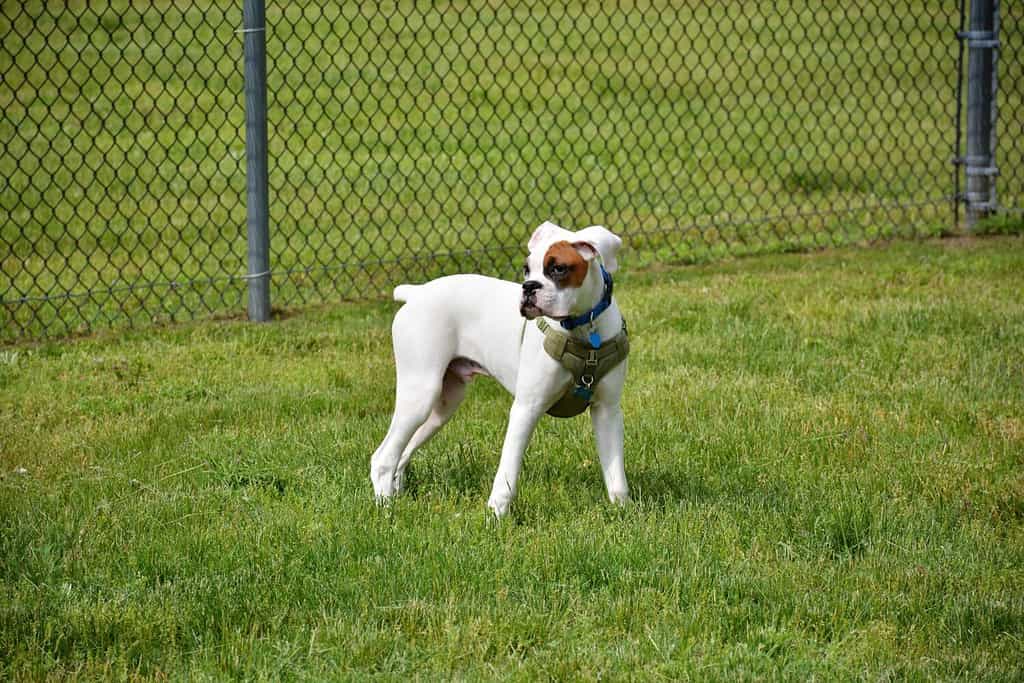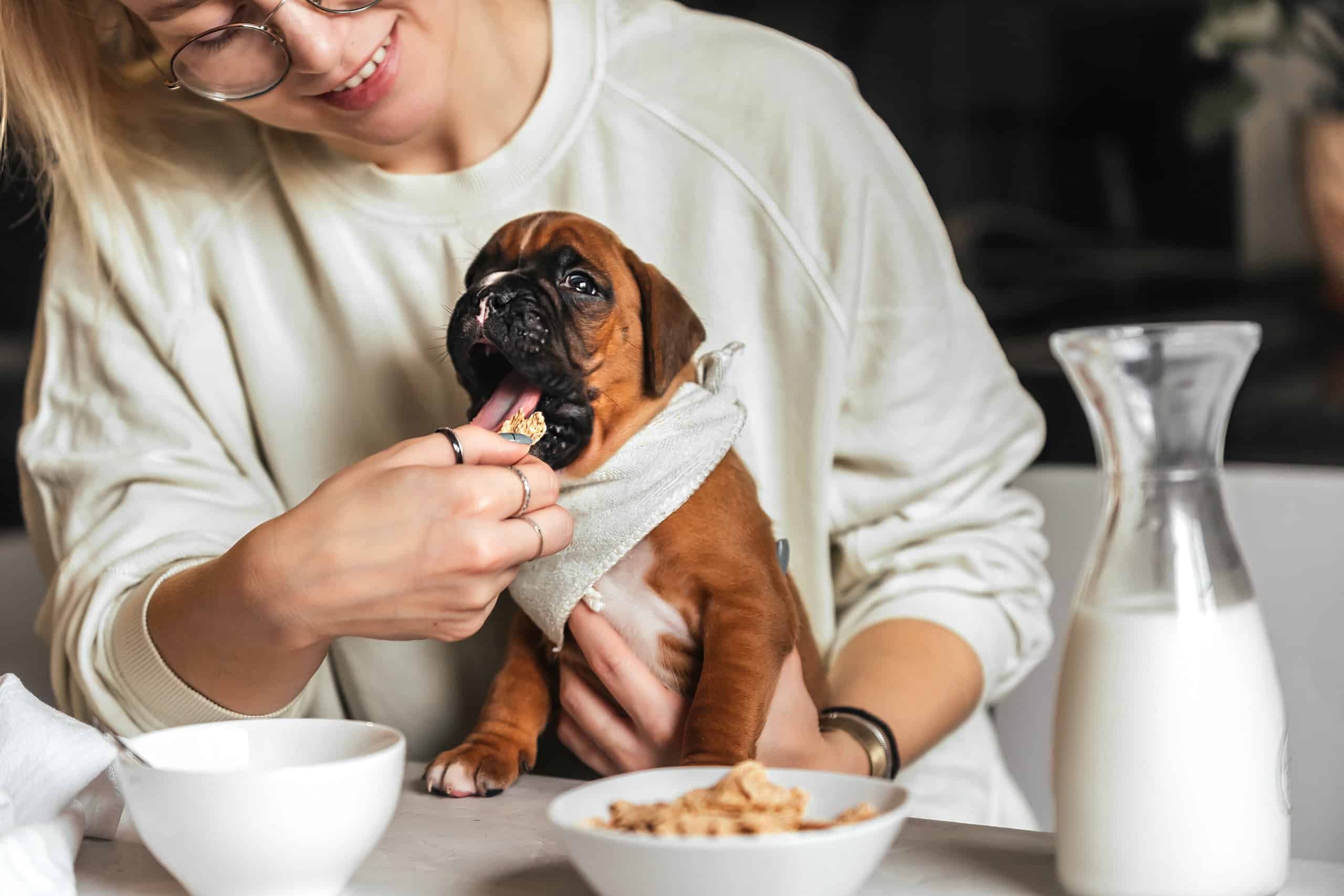Boxers are balls of energy that have the ability to brighten up even the worst days. High intelligence, athleticism, and a protective nature are just some of the wonderful qualities these dogs are known for. Although the boxer is currently hailed as one of America’s most beloved dog breeds, their origins may surprise you. If you’ve been thinking about adding a boxer puppy to your family, we’ll help prepare you. Here are some tips that will make the process of bringing your puppy home much smoother.
An Introduction to the Boxer Breed

Boxers began to gain popularity in America beginning in the 1930s.
©Touched by light images/Shutterstock.com
Boxers are relatively low-maintenance dogs. Despite this, these playful pups crave attention and affection from their owners and can be a bit demanding mentally. Because of this, it is extremely important that you have enough time to dedicate to training your boxer. The temperament of this dog will depend heavily on proper training and socialization. If you work long hours and have young children or other animals in the home, you might want to reconsider this breed. In addition, if your house has a lot of foot traffic and strangers come and go often, you should also reconsider, as boxers may become stressed in chaotic environments. According to the American Kennel Club, boxers are “deliberate and wary with strangers.” They “will exhibit curiosity, but, most importantly, fearless courage if threatened.”
It’s important to remember that not all boxers will exhibit these behaviors. However, it is still important to acknowledge the risk. Boxers are loyal, smart, and affectionate. These dogs thrive in single-animal homes with older children. Price will vary slightly depending on which type of boxer you’re interested in purchasing. In general, you can expect to pay between $1,000 and $3,500.
History of the Boxer
Boxers were initially bred in Germany as a cross between the Old English bulldog and bullenbeisser. Unlike other old working dogs, boxers have a dark and sad history. These dogs were forced to participate in the savage sport of “bull baiting.” This archaic form of entertainment involved a boxer taunting a bull in a small arena. The crowd watched as the boxer toyed with an aggressive bull, making them more and more angry. This went on until the bull finally caught the boxer, leading to a violent death. Luckily, this practice has long since died out. Since the early 1900s, boxers have become popular companion animals. Due to their large bite, strong body, and athleticism, this breed is a perfect protection dog, and many people seek them out for this very reason.
The Importance of Finding a Reputable Boxer Breeder

Boxers are very easy to groom.
©Ermolaev Alexander/Shutterstock.com
While you’re going through the process of adding a boxer puppy to your family, finding a reputable breeder is the most crucial step. It’s no secret that unethical breeding operations have run rampant in recent years, and many people who sell boxer puppies are doing so haphazardly. Puppy mills do not run genetic tests on the dogs they’re breeding. As a result, many of the puppies in the litter are plagued by genetic disorders. Often, ethical breeders offer a health guarantee on their puppies for this very reason. This means that the breeder is giving you a promise that their dogs are unaffected by any of these conditions. If they are diagnosed with a condition covered under this agreement, you’ll be able to receive a refund or a new puppy.
Although prices might be cheaper, puppies purchased from a backyard breeder are at a higher risk of congenital disorders. It’s likely that your puppy will have a poor quality of life, and in turn, you may be buried under a mountain of vet bills. In the worst-case scenario, your puppy may suffer or die prematurely. That being said, finding a reputable breeder avoids this heartache and saves you money in the long run. It’s always better to pay a little extra for some peace of mind.
How to Properly Vet Breeders

Boxers are no strangers to dog shows.
©vito natale/Shutterstock.com
Now that the importance of finding a reputable breeder is clearer, you can begin searching for one. This process may seem stressful at first, but it’s easier than you think. The quickest way to get the truth about a breeder is to seek word-of-mouth recommendations. Reach out to family and friends to ask which breeders they have done business with. Ask them questions about their dog’s health over the years and inquire if their breeder offered them a health guarantee.
If you don’t know anyone in your personal life who owns a boxer that you can reach out to, don’t worry. A wealth of online resources connects boxer owners across the country. Searching on social media for boxer groups is one way to make friends in the community. These groups are dedicated to discussing and appreciating the breed, so the members will likely be happy to answer any questions you have.
How to Prepare
If this is the first dog in your home, there are some additional expenses you’ll likely incur. You’ll want to set aside a bit of extra money for supplies such as food and water bowls, a collar, leash, and toys. In addition, you should strongly consider getting your boxer puppy microchipped for safety. If they get lost one day, this will be an easy way for those who find them to contact you.
There are also some medical expenses that you must factor in. It is important to take your puppy to an initial health screening shortly after you bring them home. If your breeder does not cover their first set of shots or neutering and spaying, these will be additional costs as well. In total, it’s best to set aside about $400 to $600 for these one-time fees.
Growth and Milestones

Because boxers are so smart, they can be slightly stubborn.
©Peter Roslund/Shutterstock.com
As a medium to large dog breed, boxers have an incredible growth spurt during their first year of life. From the time you bring them home to their first birthday, it’s likely that they’ll grow to weigh between 50 and 70 pounds depending on their gender. Boxers will continue to grow until they’re about two years old, so it’s important to make sure your home is able to accommodate a dog of this size. Since this breed is larger, you’ll also want to consider neutering them later on to prevent any potential health issues, such as hip dysplasia.
You should begin training your boxer immediately. As puppies, these dogs are ready to absorb information like a sponge because their brain is developing quickly. Take advantage of this time and try to teach them simple commands early on. Start with sit, come, or lay down and gradually work up to more complicated ones as they grow older. If you find that your puppy is too energetic to stay focused, try to motivate them with treats and positive affirmations.
Final Thoughts
Despite their sad history, the boxer is one of America’s most popular dog breeds. Those who are looking for a highly intelligent protection dog need look no further. Although they might take a bit more effort to properly train than other breeds, the payoff is worth the trouble. These dogs will dedicate their life to you as long as you do the same. Boxers live to be between 10 and 12 years old, so adopting one is a long-term commitment. Be sure you have enough time and money to properly care for a boxer before bringing one home.
Ready to discover the top 10 cutest dog breeds in the entire world?
How about the fastest dogs, the largest dogs and those that are -- quite frankly -- just the kindest dogs on the planet? Each day, AZ Animals sends out lists just like this to our thousands of email subscribers. And the best part? It's FREE. Join today by entering your email below.
Thank you for reading! Have some feedback for us? Contact the AZ Animals editorial team.








